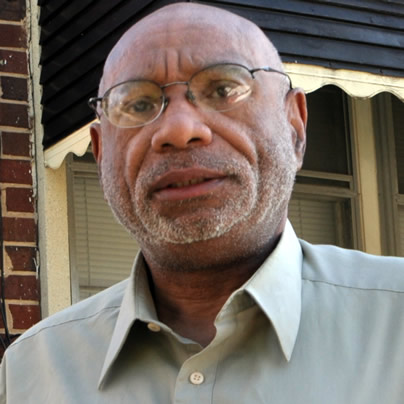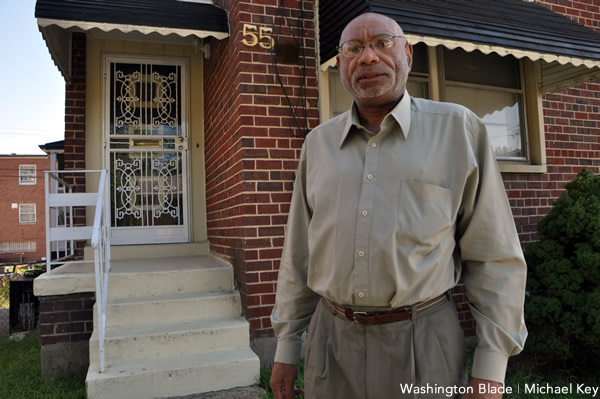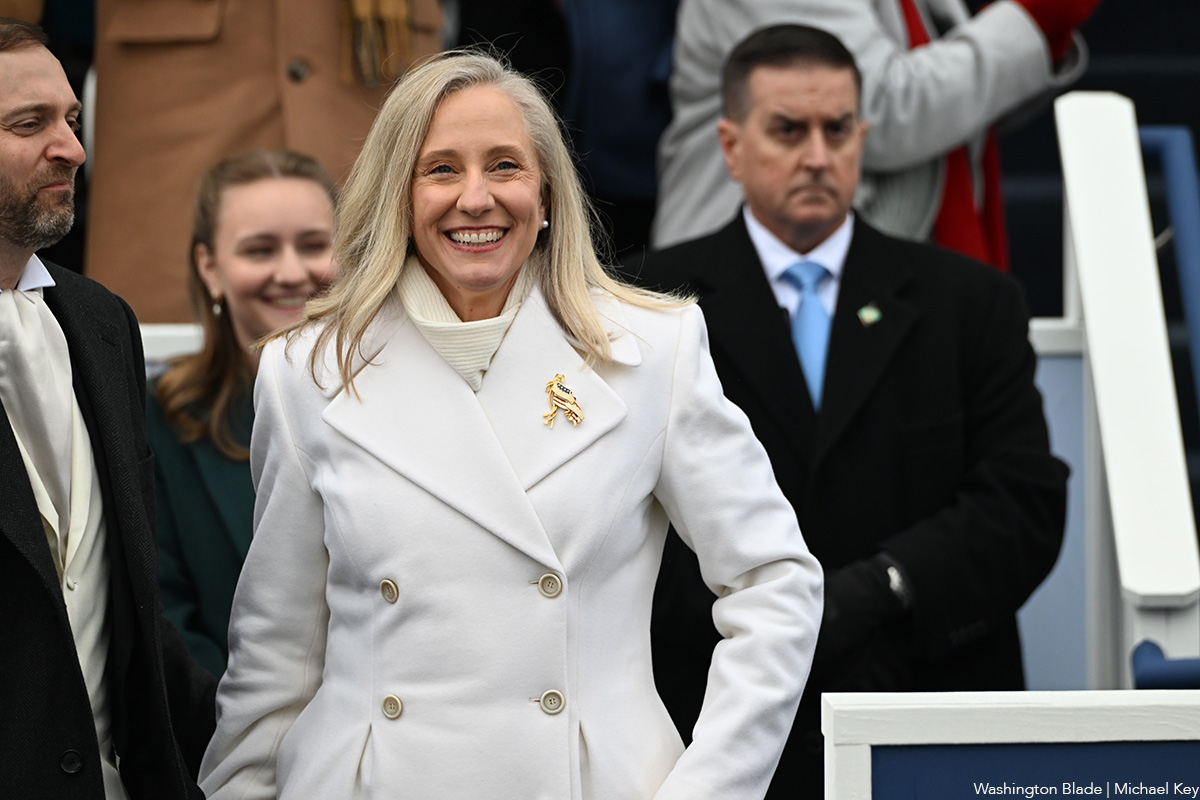Local
Activists rally for gay minister facing eviction
Faith Temple pastor opened home of 24 years for Bible study, church events


Faith Temple pastor Robert Michael Vanzant opened his home of 24 years for Bible study, church events, but now he may lose that home. (Washington Blade photo by Michael Key)
Rev. Robert Michael Vanzant, 59, the outreach pastor for D.C.’s Faith Temple, a Christian church with a special outreach to the African-American LGBT community, says he’s doing his “very best” to keep his spirits up at a time of need.
His Northeast Washington home of 24 years is in foreclosure and the Bank of America, which holds the mortgage, is taking steps to have him evicted.
“I’ve spent my entire life serving God and my community,” Vanzant said in an open letter to the bank that he released last week. “When I became disabled and my income dropped, I reached out and asked for a modification so that I could continue to pay my mortgage. You denied my request and set me up for foreclosure and eviction.”
Last week, friends and associates at Faith Temple joined the D.C. anti-foreclosure group Occupy Our Homes in staging a protest demonstration on his behalf outside the Bank of America’s loan office on U Street, N.W., just off 14th Street.
The protest organizers say Bank of America appears to have violated a city law that requires lenders to enter into a mediation process with borrowers who have fallen behind on their mortgage.
An official with the city agency that administers the mediation program said its intent is to determine whether a borrower is qualified for one of nearly a dozen federal programs that encourage and in some cases pay lenders to modify the terms of a mortgage to lower the monthly payments and enable a mortgage holder to keep the home.
Vanzant has served as a pastor at Faith Temple since the church was founded in 1982. He said he moved into his house on the 5500 block of 5th Street, N.E., in 1988 as a tenant before buying the semi-detached townhouse in 2003 from his landlord.
Isaiah Poole, a longtime member of the church and friend of Vanzant’s, said Vanzant has long opened his house for church functions, including Bible study classes. Poole said Vanzant also has opened his home as a shelter for people in need.
Vanzant told the Blade his problems began in 2008 when he became disabled due to illness and was later approved for disability status. He said that although he was no longer able to keep his full-time day job with the Metro transit agency, for the next year and a half he managed to continue making his mortgage payments through a disability insurance policy he had and later through Social Security disability benefits.
“I called the bank in early 2009 and said my income was going to change soon and I needed to talk about streamlining my mortgage,” he said. According to Vanzant, bank officials told him there were no mortgage assistance programs available for people who were current on their payments.
He said he next contacted several mortgage counseling organizations that promoted themselves as experts in helping people at risk for foreclosure. One of the organizations advised him to withhold his mortgage payments and place the money in a savings or escrow account, with the intent of working out a mortgage modification plan with the bank at a later date.
“And so that’s what I did,” he said.
But by early 2010, Bank of America began foreclosure proceedings and refused to discuss any mortgage adjustment options that had been widely publicized in the media and by the Obama administration.
“I received something from the law office that was representing the bank that they were foreclosing,” he said. “At the same time I received a notice from the Landlord-Tenant Court from the bank’s lawyer about an eviction.”
Added Vanzant, “That’s when she [the bank’s lawyer] told me, ‘They don’t want to talk to you. They won’t have anything to do with you. They don’t have anything to say to you.’”
Mike Haack, an organizer for Occupy Our Homes and one of the leaders of the protest demonstration last week, said the group plans further protests if Bank of America doesn’t demonstrate a good faith effort to work out a way for Vanzant to save his home.
“We feel the bank can take steps to allow him to keep his house,” Haack said. “The Reverend is an asset to the community.”
Vanzant, who was being treated at Howard University Hospital at the time of the Sept. 6 protest, said a representative of the bank called him at the hospital that same day, leading him to believe that the protest may have “alerted” the bank to his plight.
“I told them I couldn’t talk to them at that time because I was under medical treatment,” he told the Blade. “I said I would like to talk to them the next week.”
He said the bank’s representative called again last Friday and he arranged to speak with the representative this week.
“I’m trying to arrange for some legal representation before I talk to them,” he said. “I’ve made mistakes in the past and have had what my friends say was some bad advice” by organizations he paid to help during the past two years.
Brian Sullivan, a spokesperson for the U.S. Department of Housing and Urban Development, which administers the federal government’s mortgage assistance programs, said HUD strongly urges consumers not to pay anyone for so-called mortgage assistance services. He said HUD has a long list of HUD-approved mortgage counseling organizations and all of them offer their services for free.
He said Vanzant would likely qualify for a mortgage modification program, but a final determination on his qualifications would depend on the specific status of his mortgage, such as whether it is associated with federally linked agencies like Fannie Mae and Freddie Mac or the Federal Housing Administration (FHA).
“He has to provide all of this information to whoever he selects to help him get through this process,” Sullivan said.
Virginia
Va. activists preparing campaign in support of repealing marriage amendment
Referendum about ‘dignity and equal protection under the law’

Virginia voters in November will vote on whether to repeal their state’s constitutional amendment that defines marriage as between a man and a woman.
Democratic Gov. Abigail Spanberger on Feb. 6 signed House Bill 612 into law. It facilitates a referendum for voters to approve the repeal of the 2006 Marshall-Newman Amendment. Although the U.S. Supreme Court’s Obergefell ruling extended marriage rights to same-sex couples across the country in 2014, codifying marriage equality in Virginia’s constitution would protect it in the state in case the decision is overturned.
Maryland voters in 2012 approved Question 6, which upheld the state’s marriage equality law, by a 52-48 percent margin. Same-sex marriage became legal in Maryland on Jan. 1, 2013.
LGBTQ advocacy groups and organizations that oppose marriage equality mounted political campaigns ahead of the referendum.

Equality Virginia has been involved in advancing LGBTQ rights in Virginia since 1989.
Equality Virginia is working under its 501c3 designation in conjunction with Equality Virginia Advocates, which operates under a 501c4 designation, to plan campaigns in support of repealing the Marshall-Newman Amendment.
The two main campaigns on which Equality Virginia will be focused are education and voter mobilization. Reed Williams, the group’s director of digital engagement and narrative, spoke with the Washington Blade about Equality Virginia’s plans ahead of the referendum.
Williams said an organization for a “statewide public education campaign” is currently underway. Williams told the Blade its goal will be “to ensure voters understand what this amendment does and why updating Virginia’s constitution matters for families across the commonwealth.”
The organization is also working on a “robust media and voter mobilization campaign to identify and turn out voters” to repeal Marshall-Newman Amendment. Equality Virginia plans to work with the community members to guarantee voters are getting clear and accurate information regarding the meaning of this vote and its effect on the Virginia LGBTQ community.
“We believe Virginia voters are ready to bring our constitution in line with both the law and the values of fairness and freedom that define our commonwealth,” said Equality Virginia Executive Director Narissa Rahaman. “This referendum is about ensuring loving, committed couples and their families are treated with dignity and equal protection under the law.”
The Human Rights Campaign has also worked closely with Equality Virginia.
“It’s time to get rid of outdated, unconstitutional language and ensure that same sex couples are protected in Virginia,” HRC President Kelley Robinson told the Blade in a statement.
District of Columbia
D.C. police arrest man for burglary at gay bar Spark Social House
Suspect ID’d from images captured by Spark Social House security cameras

D.C. police on Feb. 18 arrested a 63-year-old man “of no fixed address” for allegedly stealing cash from the registers at the gay bar Spark Social House after unlawfully entering the bar at 2009 14th St., N.W., around 12:04 a.m. after it had closed for business, according to a police incident report.
“Later that day officers canvassing for the suspect located him nearby,” a separate police statement says. “63-year-old Tony Jones of no fixed address was arrested and charged with Burglary II,” the statement says.
The police incident report states that the bar’s owner, Nick Tsusaki, told police investigators that the bar’s security cameras captured the image of a man who has frequently visited the bar and was believed to be homeless.
“Once inside, the defendant was observed via the establishment’s security cameras opening the cash register, removing U.S. currency, and placing the currency into the left front pocket of his jacket,” the report says.
Tsusaki told the Washington Blade that he and Spark’s employees have allowed Jones to enter the bar many times since it opened last year to use the bathroom in a gesture of compassion knowing he was homeless. Tsusaki said he is not aware of Jones ever having purchased anything during his visits.
According to Tsusaki, Spark closed for business at around 10:30 p.m. on the night of the incident at which time an employee did not properly lock the front entrance door. He said no employees or customers were present when the security cameras show Jones entering Spark through the front door around 12:04 a.m.
Tsusaki said the security camera images show Jones had been inside Spark for about three hours on the night of the burglary and show him taking cash out of two cash registers. He took a total of $300, Tsusaki said.
When Tsusaki and Spark employees arrived at the bar later in the day and discovered the cash was missing from the registers they immediately called police, Tsusaki told the Blade. Knowing that Jones often hung out along the 2000 block of 14th Street where Spark is located, Tsusaki said he went outside to look for him and saw him across the street and pointed Jones out to police, who then placed him under arrest.
A police arrest affidavit filed in court states that at the time they arrested him police found the stolen cash inside the pocket of the jacket Jones was wearing. It says after taking him into police custody officers found a powdered substance in a Ziploc bag also in Jones’s possession that tested positive for cocaine, resulting in him being charged with cocaine possession in addition to the burglary charge.
D.C. Superior Court records show a judge ordered Jones held in preventive detention at a Feb. 19 presentment hearing. The judge then scheduled a preliminary hearing for the case on Feb. 20, the outcome of which couldn’t immediately be obtained.
District of Columbia
Judge rescinds order against activist in Capital Pride lawsuit
Darren Pasha accused of stalking organization staff, board members, volunteers

A D.C. Superior Court judge on Feb.18 agreed to rescind his earlier ruling declaring local gay activist Darren Pasha in default for failing to attend a virtual court hearing regarding an anti-stalking lawsuit brought against him by the Capital Pride Alliance, the group that organizes D.C.’s annual Pride events.
The Capital Pride lawsuit, initially filed on Oct. 27, 2025, accuses Pasha of engaging in a year-long “course of conduct” of “harassment, intimidation, threats, manipulation, and coercive behavior” targeting Capital Pride staff, board members, and volunteers.
In his own court filings without retaining an attorney, Pasha has strongly denied the stalking related allegations against him, saying “no credible or admissible evidence has been provided” to show he engaged in any wrongdoing.
Judge Robert D. Okum nevertheless on Feb. 6 approved a temporary stay-away order requiring Pasha to stay at least 100 feet away from Capital Pride’s staff, volunteers, and board members until the time of a follow-up court hearing scheduled for April 17. He reduced the stay-away distance from 200 yards as requested by Capital Pride.
In his two-page order issued on Feb. 18, Okun stated that Pasha explained that he was involved in a scooter accident in which he was injured and his phone was damaged, preventing him from joining the Feb. 6 court hearing.
“Therefore, the court finds there is a good cause for vacating the default,” Okun states in his order.
At the time he initially approved the default order at the Feb. 6 hearing that Pasha didn’t attend, Okun scheduled an April 17 ex parte proof hearing in which Capital Pride could have requested a ruling in its favor seeking a permanent anti-stalking order against Pasha.
In his Feb. 18 ruling rescinding the default order Okun changed the April 17 ex parte proof hearing to an initial scheduling conference hearing in which a decision on the outcome of the case is not likely to happen.
In addition, he agreed to consider Pasha’s call for a jury trial and gave Capital Pride 14 days to contest that request. The Capital Pride lawsuit initially called for a non-jury trial by judge.
One request by Pasha that Okum denied was a call for him to order Capital Pride to stop its staff or volunteers from posting information about the lawsuit on social media. Pasha has said the D.C.-based online blog called DC Homos, which Pasha claims is operated by someone associated with Capital Pride, has been posting articles portraying him in a negative light and subjecting him to highly negative publicity.
“The defendant has not set forth a sufficient basis for the court to restrict the plaintiff’s social media postings, and the court therefore will deny the defendant’s request in his social media praecipe,” Okun states in his order.
A praecipe is a formal written document requesting action by a court.
Pasha called the order a positive development in his favor. He said he plans to file another motion with more information about what he calls the unfair and defamatory reports about him related to the lawsuit by DC Homos, with a call for the judge to reverse his decision not to order Capital Pride to stop social media postings about the lawsuit.
Pasha points to a video interview on the LGBTQ Team Rayceen broadcast, a link to which he sent to the Washington Blade, in which DC Homos operator Jose Romero acknowledged his association with Capital Pride Alliance.
Capital Pride Executive Director Ryan Bos didn’t immediately respond to a message from the Blade asking whether Romero was a volunteer or employee with Capital Pride.
Pasha also said he believes the latest order has the effect of rescinding the temporary stay away order against him approved by Okun in his earlier ruling, even though Okun makes no mention of the stay away order in his latest ruling. Capital Pride attorney Nick Harrison told the Blade the stay away order “remains in full force and effect.”
Harrison said Capital Pride has no further comment on the lawsuit.



















